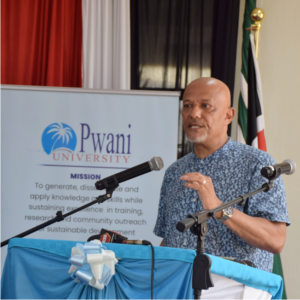The Ethics and Anti-Corruption Commission CEO, Mr. Twalib Mbarak has called on the Kenyan youth to take a keen interest and play an active role in leadership and governance matters in the society.
Mr. Mbarak provided numerous pathways through which the young people could access and engage in public affairs, including through advocacy, research and innovation, as integrity champions, and by actively participating in electoral processes.
He was addressing Pwani University students in Kilifi in a public lecture organized in collaboration with the United Nations Office on Drugs and Crime (UNODC). The lecture, themed “Youth and Governance in Kenya: Does Integrity Matter?”, was meant to sensitize the youth on ethics, integrity and their role in the promotion of good governance.
Kenya Bureau of Statistics’ 2020 National Census Report put the youth population at over 60% of the overall populace 55% of which, it is estimated, are in learning institutions. According to the African Union, about 60% of the total population of Africa is below the age of 24 years. Africa, therefore is the continent with the highest youth population on the planet.
With that demographic strength, the youth hold an enormous potential for positive action and there is need, therefore, for societal support to inspire and develop a generation that upholds integrity. As such, it is in the interest of the Commission under its education mandate, Mr. Twalib said, to harness young people’s energy, ideas and power of mobilization through such forums.
The 21st century, the Commission CEO said, is characterized by instant global communication and interdependent economies and the challenges affecting the youth are a national security concern due to their adverse impact. These include general insecurity, emergence of criminal cartels, drugs and substance abuse, infiltration of national security by undesirable elements, and growth of grey economy all of which are attributed to, mainly, corruption, and poor leadership and general moral decay.
Corruption, which Mr. Mbarak classified in five broad categories including grand corruption, administrative corruption, kleptocracy, State capture and strategic corruption, needs the National Integrity Approach to effectively fight it.

The first approach is to deal with the political culture where the emphasis in on good governance, integrity, transparency and accountability in management of public affairs. The second is to focus on societal values relating to human dignity, equity, inclusiveness and human rights. Lastly, focus on State institutions to strengthen law enforcement agencies foster independent agencies of prosecution and adjudication.
Mr. Mbarak called on the youth and the society at large to join hands in the fight against corruption and promotion of ethics.
“You have an important role to promote integrity and be powerful agents of change by developing innovative and impactful solutions within your communities,” he said and, at the same time, pledged unwavering support in the quest for an ethical society.
Also present, among other dignitaries, were the Vice Chancellor of Pwani University Prof. James Kahindi, Nandi County Governor, Stephen Arap Sang, Member of Parliament for Kilifi North Constituency, Hon. Owen Baya, and a representative of the UNODC, Ms. Jennifer Githu.



